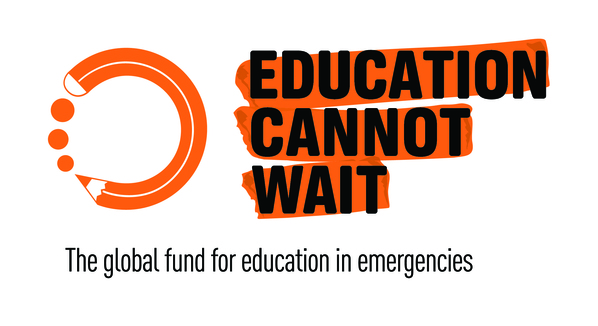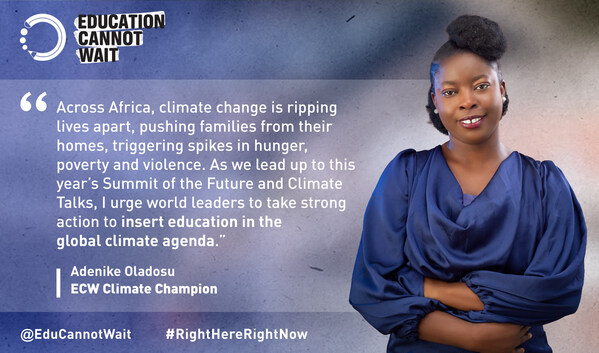 |
'The interconnected challenges of armed conflicts, forced displacement, environmental degradation and climate change are putting an entire generation at risk. To address the growing education/climate crises, we must act #RightHereRightNow to ensure access to quality education for millions of crisis-impacted girls and boys worldwide.' ~Adenike Oladosu, ECW Climate Champion.
NEW YORK, June 5, 2024 /PRNewswire/ -- On World Environment Day, Education Cannot Wait (ECW), appointed Adenike Oladosu, a visionary young climate activist from Nigeria, as its new 'ECW Climate Champion'. Known as '@The EcoFeminist' to her social media followers, Oladosu is one of Africa's most prominent climate activists, and has represented Nigeria's youth as a delegate to the Conference of the Parties (COP) Climate Talks since 2019.

With her new appointment, Oladosu called on world leaders to connect climate action with education action as we race to protect our people and our planet from the devastating consequences of the climate crisis, including its negative impacts on education.
"The interconnected challenges of conflict, forced displacement, environmental degradation and climate change are putting an entire generation at risk. To address the growing education/climate crisis, we must act #RightHereRightNow to ensure access to quality education for millions of crisis-impacted girls and boys worldwide," said Oladosu. "Across Africa, in places like Lake Chad, climate change is ripping lives apart, pushing families from their homes, triggering spikes in hunger, poverty and violence, and derailing efforts to deliver on promises outlined in the Paris Agreement and Sustainable Development Goals. As we lead up to this year's Summit of the Future and Climate Talks, I urge world leaders to take strong action to insert education in the global climate agenda."
"Adenike Oladosu is a tireless advocate for climate action in Africa and beyond. As our new 'ECW Climate Champion,' Oladosu is spearheading a global movement to connect climate action with education action as we work together to address the life-threatening challenges of rising seas, spiking temperatures, ever-more-severe droughts, floods and natural hazards that are derailing development gains and denying children their human right to a quality education," said Yasmine Sherif, ECW Executive Director.
Oladosu is the founder of the "I Lead Climate Action Initiative," and was the grassroots initiator of the Fridays for Future movement in Nigeria. Through her advocacy, she has mobilized millions of people around the globe to take action on climate change. In 2019, she was awarded the 'Amnesty International Nigeria Ambassador of Conscience' award for her fight for climate justice. With a degree in Agricultural Economics, Oladosu has continued her academic work as a research fellow for Alexander von Humboldt, hosted by the Panel on Planetary Thinking at Justus Liebig University in Germany and other leading think tanks, and has developed a curriculum on climate change and ecofeminism that is benefiting people across Africa.
At last year's Conference of the Parties in Dubai (COP28), ECW issued a global appeal for US$150 million to support ECW and its global strategic partners to reach 2 million children impacted by the converging threats of climate change, armed conflicts and forced displacement with the safety, hope and opportunity of a quality education.
At COP28, Denmark announced approximately US$6.5 million in additional funding to Education Cannot Wait to scale-up access to quality educational opportunities for girls and boys living on the frontlines of the climate crisis.
"Denmark serves as a shining example by stepping forward and responding with this additional contribution to ECW allocated to climate change and education. We call on all public and private sector partners to follow suit," said Sherif.
The challenges are unprecedented. By 2050, climate impacts could cost the world economy US$7.9 trillion and could force up to 216 million people to move within their own countries, according to the World Bank.
"Climate change is increasing the frequency and intensity of extreme weather events such as cyclones, floods, droughts, heatwaves and wildfires as well as the probability of co-occurring events. These extreme weather events are increasingly disrupting schooling and precipitating learning losses, dropouts, and long-term impacts," according to recent analysis by the World Bank.
The education of 75 million children is estimated to have been disrupted by conflict and natural hazards. These are projected to increase in frequency and severity with climate change. Over 99% of children around the world are exposed to at least one major climate and environmental hazard. These are eroding education outcomes and recent progress in improving school access and learning.
With its global strategic partners, ECW is delivering with speed and impact to address these growing challenges. In the aftermath of devastating floods in Libya and Pakistan – and spikes in hunger, forced displacement and violence across the Horn of Africa and the Sahel – ECW issued emergency grants to get children and adolescents back to learning.
Within existing programmes in crisis-impacted countries like Bangladesh, Chad, Nigeria, South Sudan and Syria, ECW investments are supporting climate-resilient infrastructure, disaster risk reduction and school meals, offering hope and opportunity in the most challenging circumstances.
World Environment Day offers a key opportunity to rethink how we deliver climate actions worldwide. With quality, holistic education opportunities, every child on the planet can be a part of #GenerationRestoration.
On X/Twitter, please follow: @EduCannotWait @YasmineSherif1 @KentPage
Additional information available at: www.educationcannotwait.org